
8 Best Anti Inflammatory Foods for Dogs: Diet, Recipes and Natural Remedies
Anti-Inflammatory Food for Dogs
Your dog is in pain and you want to help. Maybe their symptoms are getting worse, their movement is restricted or they are in visible discomfort.
You know that diet can play a big role in inflammation, but you're not sure where to start or what will work for your dog.
This guide covers everything you need to know about anti-inflammatory foods for dogs. I'll give you dietary recommendations, cover supplements, common stressors and answer many of your questions related to inflammation and dog food.
The number one thing you can do right now is get your dog a high quality bone broth to use as a meal topper. Bluebird Provisions is my go-to recommendation because it is high in collagen protein, glucosamine and chondroitin.
First a quick note: this website is reader-supported. With the help of my two dogs (Atlas and Nitotem) I spend a lot of time personally evaluating, testing and reviewing each product on this list. When you buy through links on our site, I may earn an affiliate commission that helps keep them happy and well fed.
8 Best Anti Inflammatory Foods For Dogs
The best anti inflammatory foods for dogs include bone broth, fatty fish, berries, ginger and omega-3s. Read below as I will go through each of these briefly.
|
Best Overall |
|
|
Best For Brain and Eye Health |
|
|
Best For Antioxidants |
|
|
Best Inflammation |
|
|
Best For Joints |
1. Best Overall: Dog Bone Broth (Beef or Chicken)
Bone broth is included as an anti-inflammatory food for dogs because of the collagen protein, glucosamine, glutamine and glycine. These foods are among the most potent anti inflammatories we have access to.
They are particularly beneficial to heal your dogs damaged GI tract, diarrhea, digestive issues and for joint pain.
You can easily add it to your dog's regular wet or dry meals by pouring 1/8 to 1/4 cup of liquid or 1 tsp to 1 tbsp of powder. Mix it all together and your pup gets a delicious gravy topper.
Dehydrated bone broth keeps the nutritional benefits of raw meat intact, which makes it an ideal food for dogs with allergies or sensitivities to bones. The absolute best bone broth for dogs is made by Bluebird Provisions.
They make both a grass fed beef and pasture raised chicken bone broth made specifically for your furry friend.
I've been feeding my two dogs these bone broths for the last two years. Their skin and coats are shiny and they are more active than ever. My husky trail runs with me everyday and he's the most agile dog I've ever seen.
2. Omega-3 Fats (Fish Oil, EPA and DHA)
Omega-3 fatty acids are what you typically find in fatty fish, which I mentioned above. They are beneficial for dogs and humans, and can help to control inflammation and promote brain health.
I gave them their own section to stress the importance and note that they found in many pet foods, but not all of them.
Feeding your dog omega-3s from plant sources (such as flax) is not as beneficial as feeding them omega-3s from fish.
This is because the type of omega-3 (ALA) is not converted to the EPA and DHA (that provide ALL of the benefits) as efficiently as animal sources.
There are many types of omega-3 supplements available for humans and pets. The best one I found is the Wild Alaskan Salmon Oil from Zesty Paws. It is sourced from wild caught alaskan salmon in a sustainable way.
It also has the highest EPA and DHA ratio of any others I found. This means they are not stuffing it with other stuff.
I would recommend that you carefully check the quality control practices and sourcing of the manufacturer before buying a supplement for your dog. When in doubt, check with your vet first.
Salmon, mackerel, herring and sardines are the best real food sources.
3. Blueberries
Dogs love eating blueberries for their rich flavor and nutritional benefits. They are a fantastic source of antioxidants, potassium and vitamin C.
The benefits of blueberries help to reduce free radical damage which lowers chronic inflammation.
I'll feed them to my dogs as treats, but you can easily just add a handful to their meals. I've even heard of some pet owners blending them to make "doggy smoothies." While fresh organic are best, I do like freeze dried blueberries if you're in a pinch.
The certified organic wild blueberries from OSEL are the best dried ones I've found.
4. Turmeric
Feeding turmeric to dogs can help reduce inflammation, improve digestive and metabolic function and provide other health benefits.
A 1/4 tsp of turmeric is enough for smaller dogs, while larger dogs need more. Or you can feed them turmeric chews for dogs. I found these and started giving them to my poodle Atlas, who is getting up there in age and needs all the help he can get.
For what it's worth, his energy and movement seem better since I started. I'll keep using them as he gets older because they are relatively inexpensive and he loves them.
Check with your vet for specific feeding instructions if you are unsure because you don't want to do too much.
5. Glucosamine and Chondroitin
Glucosamine is an amino acid made in human and canine bodies. It plays an important role in the formation and repair of cartilage and other tissues.
It is available in powder form or chewable tablets that my dogs love. The best ones I've found are the Nutramax tabs, which are fortified with chondroitin and MSM.
These are two other potent anti inflammatories that help to treat arthritis, joint pain and other inflammatory conditions in humans and dogs. I give them to both of my dogs and they gobble them right up.
Ingredients: Glucosamine Hydrochloride 600 mg, Sodium Chondroitin Sulfate 300 mg, Methylsulfonylmethane (MSM) 250 mg, Manganese (Manganese Ascorbate) 3 mg. Other Ingredients: Brewers dried yeast, dextrose, magnesium stearate, microcrystalline cellulose, natural & artificial flavors, and silicon dioxide.
Even my pick eater Atlas, seems to love them. I see these as great insurance as my dogs get older. Give it a shot for a month and see how your pups like it.
6. Fatty Fish: Sardines, Herring, Salmon, Anchovies
Feeding your dog fatty fish is a great way to provide them with protein and omega-3 fatty acids.
It is important to make sure all bones are removed from fish before serving it to dogs, as these can easily be choked on.
That being said, it is pricey to feed it to yourself, let alone your canine friend. So many brands used deboned with scraps in their dog foods to capitalize on this trendy benefit. Do your research to ensure you are getting omega-3s in the food. Or else there is no benefit to switching to a fish based food.
If you're looking for something safe to supplement your dogs diet with to get omega 3s, then I recommend trying some sardines in water. Seasons is my favorite brand for this because it is wild caught, certified sustainable and a great source of EPA and DHA.
7. Dark Leafy Greens
Dark leafy greens like kale are high in antioxidants and vitamins. Similar to blueberries, they help make your dogs feel better. They also have fiber, prebiotics and a bit of protein (surprisingly) to help keep your dog's gut health in tact.
8. Ginger
The age-old remedy for upset stomachs, ginger is also used to fight inflammation. So what makes it so good? It is a great source of antioxidants which help clear out free radicals from dog's cells.
It is also used to treat joint pain in elderly animals. You can find some awesome ginger dog treats to get some or you can get a ginger extract dropper that you put on your pup's regular food.
The treats are great and convenient because you just give it to them in place of other treats. I do like the dropper if you are using strictly as a supplement because you can get more concentrated doses of ginger.
What is Inflammation in Dogs
Inflammation is the body's response to injury or illnesses. It's their way of protecting and healing themselves by dilating blood vessels and sending white blood cells to the affected area.
If you notice your dog is limping, has red or swollen skin or is licking a particular area excessively, they may be experiencing inflammation. If you are concerned, take them to the vet for a check-up.
Let's talk about the difference between acute and chronic inflammation. Acute inflammation in dogs is a normal response to injury or illness. Swelling or allergic reactions are common examples that you may notice in your pup.
Chronic inflammation, on the other hand, is harmful and can cause long-term disease. It is systemic, meaning all over the body. Common areas are in the gut / digestive system and in the joints, ligaments and tendons.
Chronic inflammation can lead to major diseases like cancer, arthritis, heart disease, autoimmune conditions and more.
What causes inflammation in dogs?
There are many possible causes of inflammation in dogs, environmental stressors to physical, internal and external causes.
Let's go through each briefly.
1. Physical stressors
Physical stressors that can cause inflammation in dogs include going for walks, playing with other dogs, being restrained or disciplined.
2. External stressors
Dogs can be affected by external stressors too. These include exhaust from cars, pollution, herbicides sprayed on grass in parks or other areas, chemicals in foods or soaps and allergens in food.
3. Internal stressors
Internal stressors include bacteria or parasites that may occur because your dog ate something they shouldn't have or was exposed to it drinking water from streams.
4. Mental stressors
Mental stressors are the same in dogs as they are in humans. Dogs get worried, anxious and depressed just like we do. Separation anxiety can cause inflammation, as can worry about the next meal or an erratic walk schedule. Try to provide predictable times for these things to calm them down.
What is Anti-Inflammatory Dog Food
Anti-inflammatory dog food is food made with specific ingredients that help to reduce inflammation in dogs. It is often made with things such as omega-3 fatty acids, antioxidants and bone broth.
But reducing inflammation is more about removing common trigger foods as it is about adding beneficial foods. Many dogs have allergies that are difficult to test or detect.
As such, you may be feeding them food that they are sensitive to, without knowing it unless you pay close attention.
How do I know if my dog needs an anti-inflammatory diet?
If your dog has skin or coat issues, frequent licking, poor digestion, frequent or soft poos, discomfort walking then an anti-inflammatory diet may help to treat these symptoms. It if often sensitivities to certain foods that trigger these nasty symptoms.
An elimination diet or experimenting with different brands of food sources may be your best bet.
The other behavior that is often missed is lack of energy compared to your pup's baseline levels. Are they suddenly lethargic and uninterested in walks or play? It may be the food they are eating. Note any recent changes that you can trace back to it.
The Role of Allergies to Dog Food Ingredients and Treats
The role of allergies to common dog food cannot be stressed enough. Many dogs have food sensitivities that are difficult to detect and address... since they can't outright tell you how they are feeling.
I bring this up because we always try to do the 'right thing' by buying expensive food and products. But what if we are feeding them something that actually hurts them in the long run?
Dogs with allergies can suffer from a number of different problems, including breathing difficulties, skin rashes, too many bowel movements daily, constant licking and itching.
It's important to address allergies in dogs early on so that they can start to feel better and have a better life. Pay special attention to the symptoms above whenever you try a new food, treat or supplement.
It takes some trial and error with different food groups and dog food to find out which works for your pup. But it will be worth it in the long-run.
How do I transition my dog to an anti-inflammatory diet?
You must gradually transition your dog to an anti inflammatory diet by introducing new ingredients or foods slowly over a period of weeks. Otherwise, you risk more complications due to dog's sensitive digestive systems.
You don't necessarily need to change their diet to help with joint pain. Oftentimes, simply adding a couple of the right foods to their existing diet can reduce pain and inflammation.
For example, my poodle suffered from gut issues and soft bowel movements (up to 5 per day). My partner and I tried endless different food sources but couldn't find one that calmed his digestion down.
Two years ago we started adding 1 tbsp of bone broth powder to his regular kibble. Now we are proud to say that he is regular and only poos twice per day.
My point is that you don't need to go out and buy all the ingredients listed above. Try one or two first, based on your goals, for 2-3 months. See how your pup moves and feels after that and adjust accordingly.
You may need to try different combinations or a whole new dog food to get it right. Of if you need more help, then you can read this review of the top 6 bone broths for dogs.
What are some common supplements used for anti-inflammatory diets in dogs?
Common supplements used to reduce inflammation in dogs are bone broth, omega-3 fats and glucosamine. These three have many health benefits and 1000s of years or use.
It is important to note that you can't just feed them any product you have in the pantry. For example, you need to do your research on omega-3s, glucosamine or bone broth for dogs.
Before introducing anything new into your dog's normal healthcare regime, always consult with a holistic veterinarian first. This will help to ensure that any changes are made in a healthy and harmonious way for both you and your pet.
How do I know if my dog is responding well to an anti-inflammatory diet?
Pay close attention to your dog's behavior to see if they are responding to an anti-inflammatory diet. Look for their bowel movements (frequency and consistency), physical nature when getting up or walking, mood, skin/coat health and energy levels.
Bowel movements should be around twice daily. You want consistency that is easy to pick up. Not too soft and not too hard.
Pay close attention to how they look when they get up in the morning or after lying down. Are they stiff and take a few minutes to get moving? Or are they more supply and spry than usual. This tells you if your diet changes are on the right track.
Also pay attention to their running and walking. Do they look happy or labored?
Finally, look at their overall energy levels and mood throughout the day. Are they happier than usual and more relaxed? Or are they more anxious.
While these subjective measures are not perfect, they are some of the best we have without doing expensive blood testing. And unfortunately our little fury friends can't verbally tell us how they are feeling.
Are there any risks to feeding my dog an anti-inflammatory diet?
The risks of feeding your dog an anti inflammatory diet are low. There is a small chance that you introduce a new food or ingredient that they are allergic to. But these ingredients are not common allergens... almost by definition.
Be sure to gradually introduce these things over time for best results.
How can I reduce inflammation in my dog naturally?
You can naturally lower inflammation in your dog by making sure they get enough exercise, eat an anti inflammatory diet and feed them bone broth, antioxidants, omega 3s and glucosamine.
What are the anti-inflammatory raw foods for dogs?
Some raw foods you can give your dog to reduce inflammation are raw meat, bones, blueberries and whole, fatty fish. But make sure you introduce any new food in moderation to see how your dog reacts to it.
What are anti-inflammatory foods for arthritis dogs?
Some common foods for dogs with arthritis are glucosamine, chondroitin, bone broth, collagen, turmeric and omega 3 fats. While they will not cure arthritis, they can slow it down and give your dog a more comfortable life so that they can enjoy themselves and play hard.
Is chicken inflammatory for dogs?
Chicken is not inflammatory for dogs unless they are allergic to it. So you can feed them chicken unless you notice reactions like diarrhea, vomiting, itching or eye discharge.
Closing Thoughts
An anti-inflammatory diet can be a game-changer for dogs suffering from joint pain, allergies, hot spots and other chronic health conditions.
By including bone broth, omega-3s and other anti-inflammatory foods in your dog's diet, you can help improve their symptoms and quality of life.
Bluebird Provisions Dog bone broth has more potent anti inflammatory ingredients than any other food. Try some today and see the difference in your pup.
Have you tried any of the foods listed in this article fo your dog? What else did you try? Leave a comment and let me know what worked and what did not.
Disclaimer: The information in this article is for informational purposes only. It is not intended to be used to treat or supplement any pet's diet. Consult your veterinarian or animal health specialist if you have questions about anything related to their food, consumption or health.
Bluebird Provisions is reader-supported. When you buy through links on our site, we may earn an affiliate commission. As an Amazon Associate, we earn from qualifying purchases.

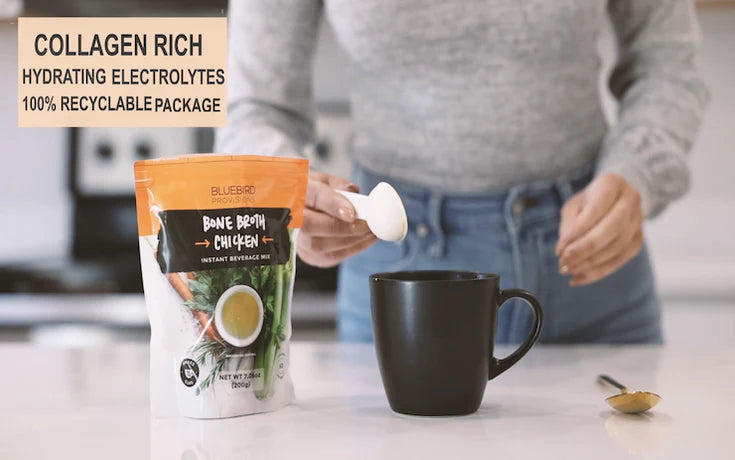

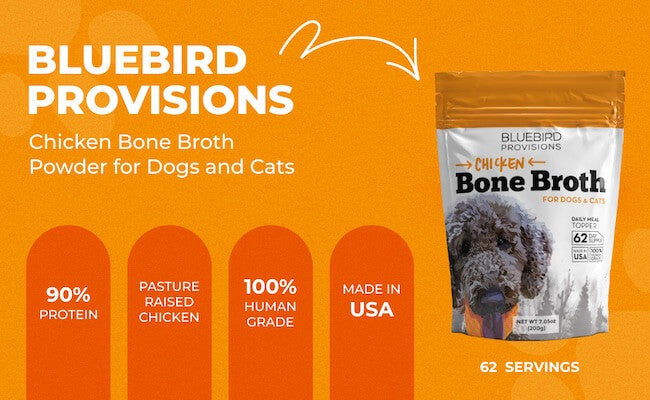
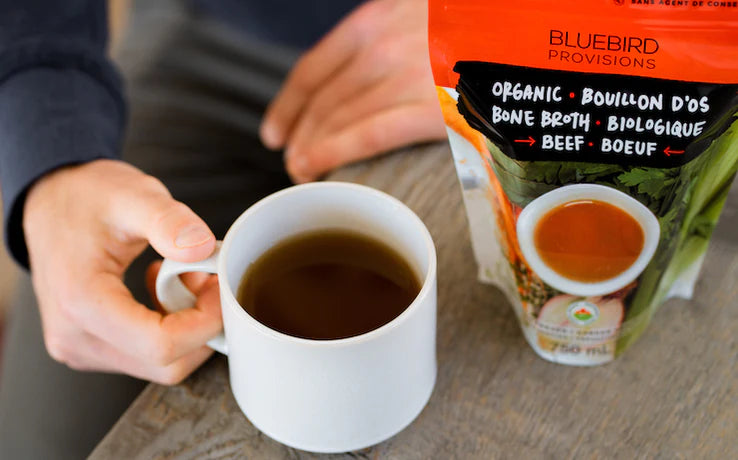



















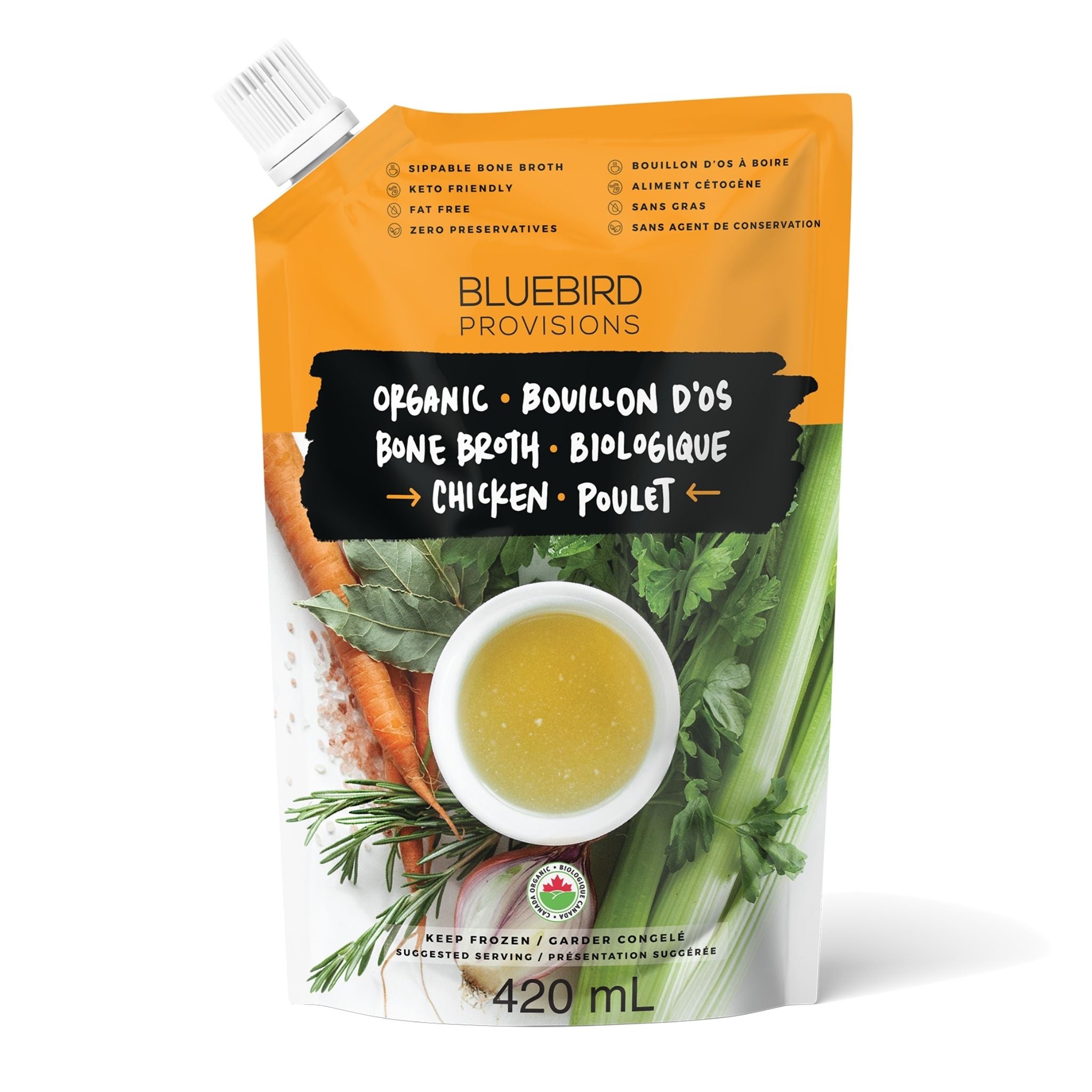
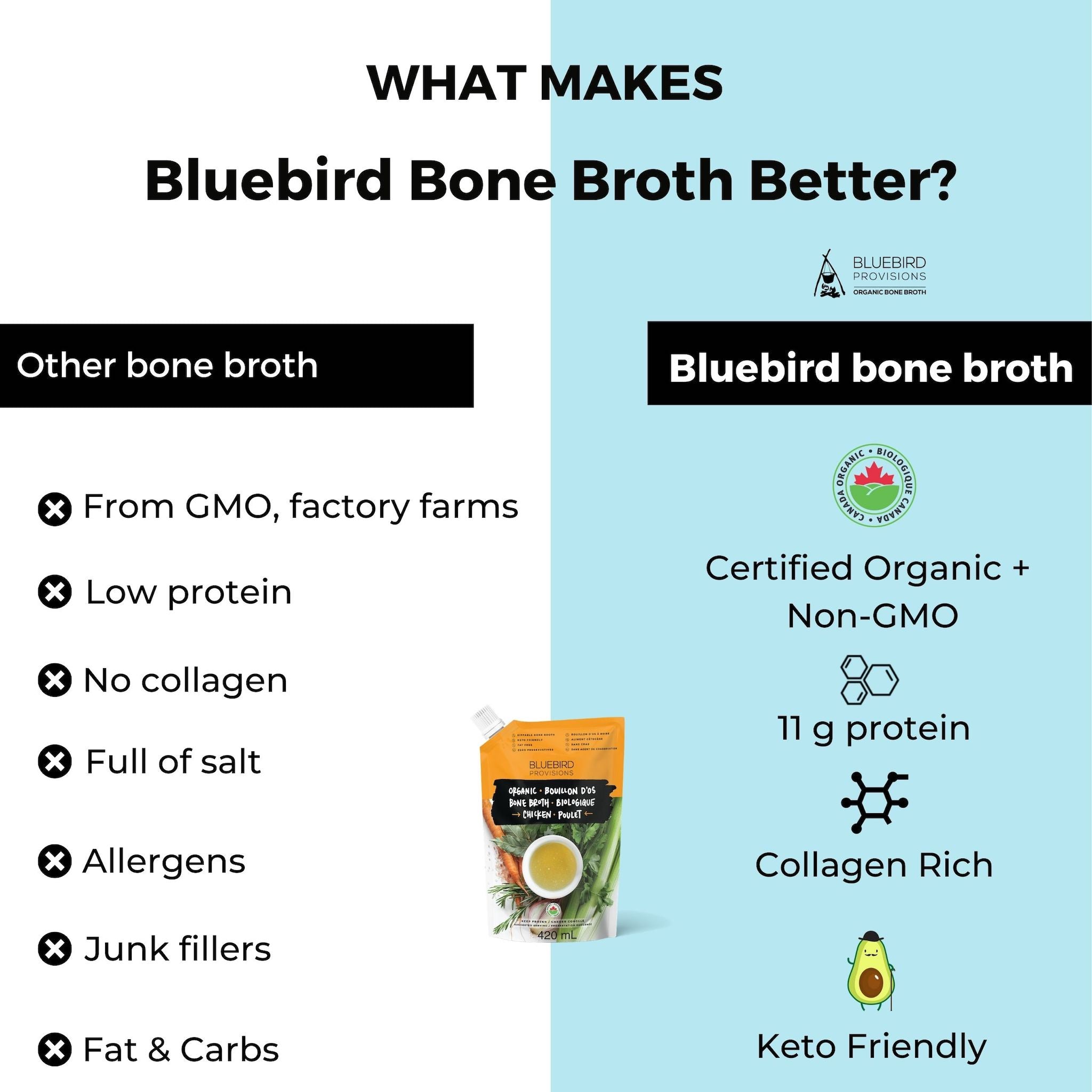
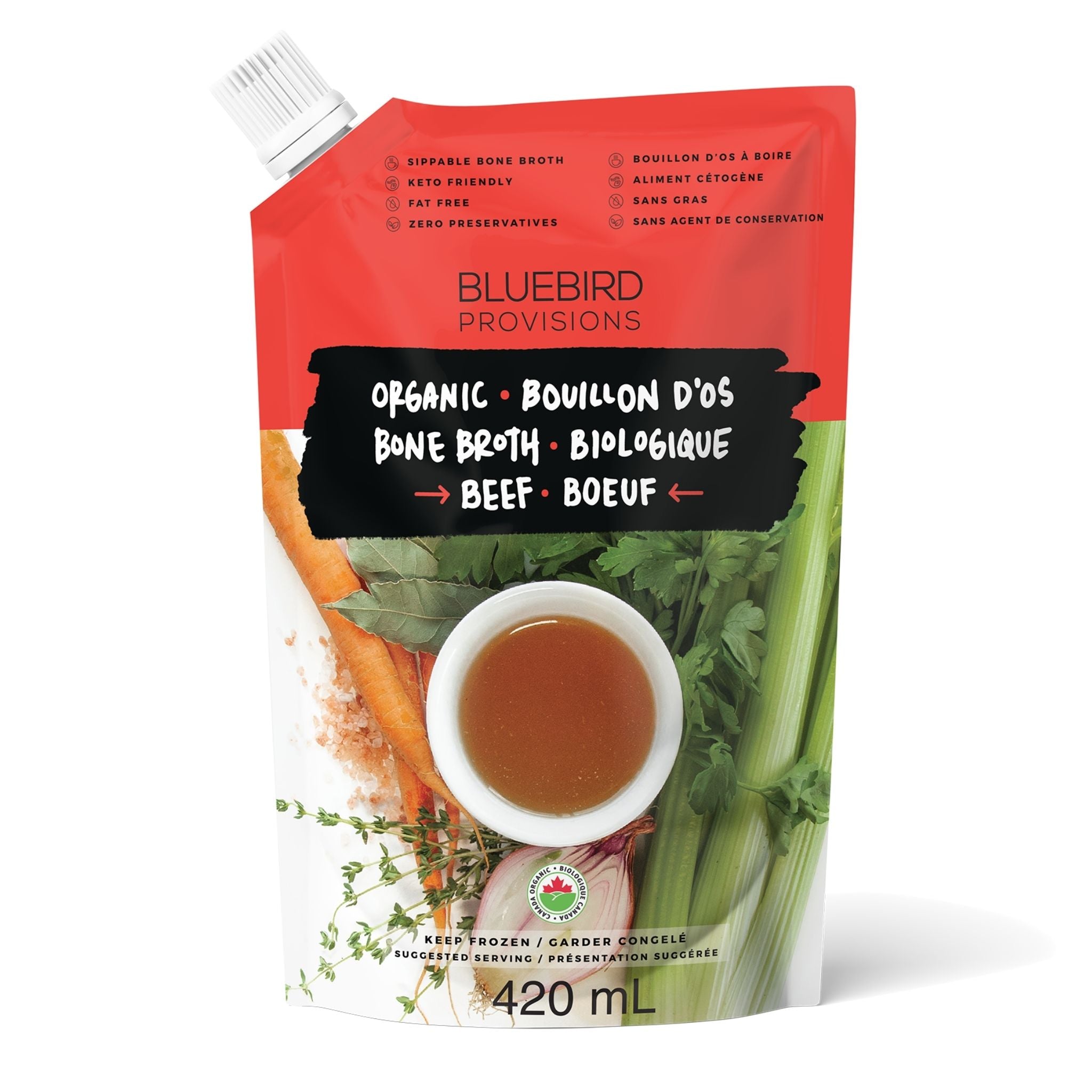
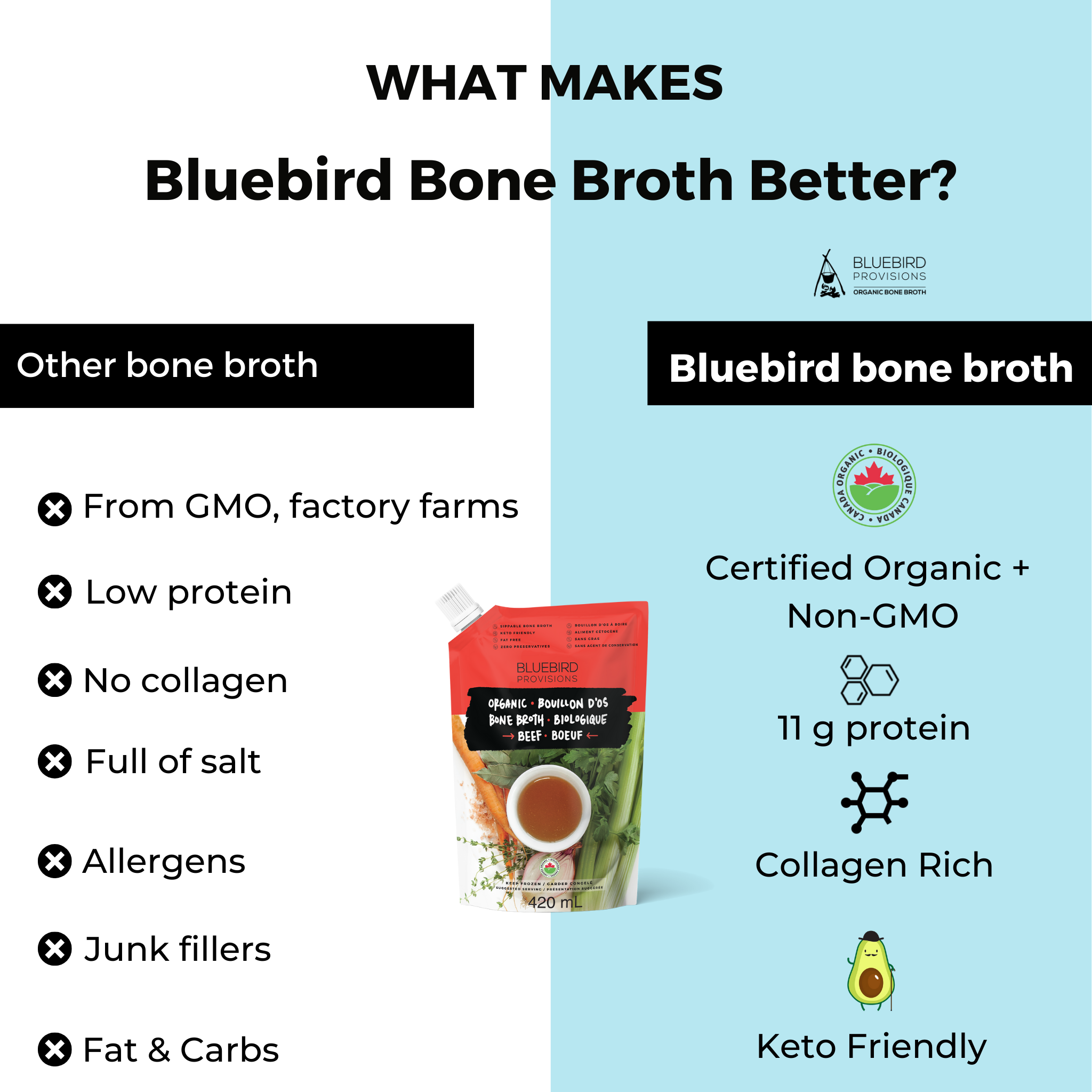
Leave a comment
This site is protected by reCAPTCHA and the Google Privacy Policy and Terms of Service apply.